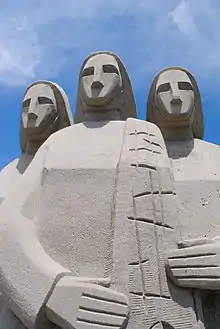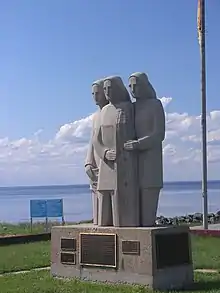Claude Roussel
Claude Roussel CM ONB (born 1930) is a Canadian sculptor, painter and educator.

Early life and education
Roussel was born in 1930 in Edmundston, New Brunswick, Canada. He was 10 years old when he began sculpting wood. At the age of 14, Roussel's artistic possibilities was discovered by Dr. Paul Carmen Laporte (1885-1973, surgeon, artist and mentor) when Roussel shows him a plaque entitled Trout (1944), an artwork created using only a file and his own intuitive knowledge.[1] With Laporte's mentorship, Roussel advanced his wood carving techniques, and showed his early works at his first solo exhibition in 1947, at the age of 17, the year he completed his Lycée studies in Edmundston.
From 1950 to 1956, he studied under the tutelage of art professors at the École des beaux-arts de Montréal in Quebec, Canada, where he graduated with a diploma in drawing professorship in 1955, and a diploma in sculpture in 1956.[2] During his studies, Quebec's artistic revolutions of Le Refus Global, 1948, and Les Automatistes, 1941-1960 played an influence on Roussel, who not only admired but practised within his own work their expressive forms of art, and implemented the use of bold colours and abstract forms.[3] In 1961, Roussel was awarded a Senior Fellowship from the Canada Council for the Arts to study Europe's important art, especially architectural decorations in England, France, Italy and Spain.
Career
After completing his studies, Roussel returned to his hometown where he became the first professional artist to teach Education Through Art in the public school system of the province of New Brunswick.[4] From 1959 to 1961, Roussel was employed at the Beaverbrook Art Gallery in Fredericton as the first francophone occupying a curatorial position. During the public announcement of his appointment, Lord Beaverbrook stated "I think young Roussel will give the gallery a major liaison with the Acadian culture of this area and at the same time impart to our French Canadian artists a real sense of belonging".[5]
In 1963, at the invitation of Father Clément Cormier, vice chancellor and founder of University de Moncton, New Brunswick, and with a special grant from Canada Council for the Arts, Roussel became the first Artist-in-residence given the responsibility to develop the visual arts curriculum. He is the founding director of the university's Visual Arts Department who occupied the position from 1963 to 1971, and again from 1976 to 1979. He is also the founding director of the university's Art Gallery, from 1964 to 1967, during which he organized in 1964 an exhibition of Canadian masters - Borduas, Pellan, Riopelle et Dumouchel - and the first two major exhibitions of works by Acadian artists, Selection 65 and Selection 67. He retired from his position as professor in 1992 after a tenure of 29 years.[4]
Roussel was a member of the Maritime Education Foundation and the Jack Chambers Memorial Foundation. He was chair of Louise-et-Reuben-Cohen acquisition fund for the Art Gallery of the University of Moncton until 1991. From 1971-1976, he was the founding president of Canadian Artists Representation (CARFAC) representing New Brunswick.[2]
Notable monumental artwork
Roussel has been exhibited at more than 200 solo and group shows in Canada and internationally. His artworks are found in many countries but especially in Canada's eastern provinces.[2] Roussel has created more than 60 monumental and public art sculptures, twelve of which are listed below.[4]
- Beavers, 1959, limestone, Officer's Square, Fredericton, New Brunswick (presented to Lord Beaverbrook by the Government of New Brunswick on the occasion of his 80th birthday)
- Fishermen's Monument, 1959-1969, limestone, Escuminac Disaster Monument Provincial Historic Site, New Brunswick
- Éros, 1971, welded Corten steel, Université de Moncton, Moncton, New Brunswick
- Progression, 1972, fiberglass, City Hall of Saint John, New Brunswick
- Atlantic, 1976, steel and epoxy, Summer Olympic Games XXI, City of Kingston, Ontario
- Brûlez et détruisez tout, 1986, polyester paste, Grand-Pré National Historic Site, Nova Scotia
- Dina Bolts, 1988, XXIV Summer Olympic Sculpture Garden, Seoul, South Korea[6]
- Monument Père Clément-Cormier, 1990, bronze casting, Université de Moncton, Moncton, New Brunswick
- Moncton 100 Monument, 1990, bronze, steel and granite, Moncton, New Brunswick
- Transition 2000, 1999, welded brass and copper, UNI Coopération financière, Moncton, New Brunswick
- Monument Mère Marie Léonie, 2004, bronze casting, Memramcook, New Brunswick
- Inspire-Action, 2017, welded steel, City of Dieppe, New Brunswick
Gallery
 Moncton 100 Monument, 1990
Moncton 100 Monument, 1990 Fishermen's Monument, 1959-1969
Fishermen's Monument, 1959-1969 Eros, 1971
Eros, 1971
Awards and honours
- 1964: Allied Arts Medal of the Royal Architectural Institute of Canada
- 1967: Centennial Medal
- 1972: Knight of the Order of the Pléiade
- 1976: Symposium olympique
- 1977: Commemorative Medal of the Queen
- 1982: Medal of the Order of the Pléiade
- 1984: Order of Canada
- 1989: First Prize of the Marion McCain exhibit, Beaverbrook Art Gallery, Fredericton
- 1992: Medal for the 125th anniversary of Canada
- 2002: Order of New Brunswick[7]
- 2005: Lieutenant Governor's prize for lifetime achievement
References
- "Sculptors: reliefs of artisans" Toucherdubois.ca
- "Biography Archived 2016-04-20 at the Wayback Machine" at "Artothèque: Overview of contemporary art in Acadia", Galerie d'art Louise-et-Reuben-Cohen, University of Moncton
- Marchand, Anik (2021). "The Renaissance of Contemporary Acadian Art in New Brunswick". CreatedHere. Archived from the original on 2022-01-11.
- Gallery of the University de Moncton, Acadian artists: Claude Roussel
- "Sculptor Is Named To Art Staff". The Moncton Times (Oct. 28). 1959.
- "Dina Bolts (디나볼즈) - Olympic Park - Seoul, Korea - Abstract Public Sculptures on Waymarking.com". www.waymarking.com. Retrieved 2018-03-13.
- Canada, Government of New Brunswick (28 September 2010). "Complete List of Recipients". www2.gnb.ca. Retrieved 2018-03-13.
Further reading
- Herménégilde Chiasson, Patrick Condon Laurette, Claude Roussel: sculptor, Moncton, NB: Éditions d'Acadie, 1985, 1987. ISBN 2-7600-0115-6
- Official Website of Claude Roussel